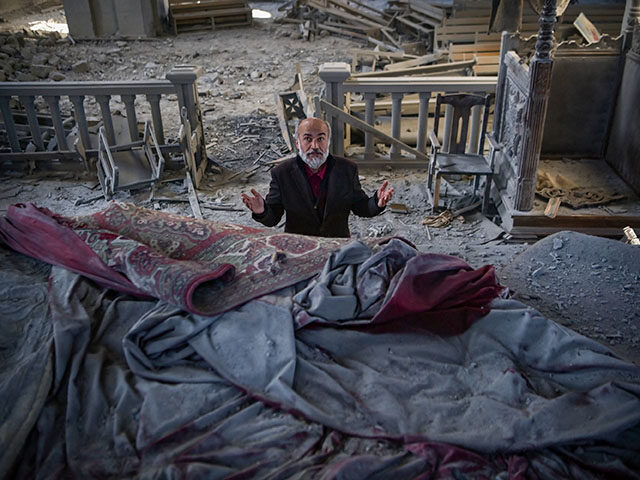The congressional Tom Lantos Human Rights Commission, chaired by Rep. Chris Smith (R-NJ), held a hearing Wednesday to discuss the plight of Armenian Christians trapped by an Azerbaijani blockade in the contested Nagorno-Karabakh region. The commission heard testimony from experts who said Azerbaijan’s actions clearly constituted genocide, with complicity from Turkey and the Islamist forces it has dispatched into the region.
Nagorno-Karabakh is a mountainous territory about the size of Delaware in Azerbaijan that has been inhabited by Armenians for centuries. The Azerbaijanis are mostly Muslims, while the Armenians are Christian.
The Armenians in Nagorno-Karabakh fought an unsuccessful war of secession in 1994 following the collapse of the Soviet Union, then remained as a semi-autonomous colony supported by the Armenian state.
Sporadic clashes over the years erupted into a full-blown war in 2020, which concluded with a cease-fire brokered by Russia in November of that year. Azerbaijan was generally seen as victor in the conflict, as Armenia was required to hand over control over some border territories.
Fighting broke out again in late 2022 despite the presence of Russian peacekeepers. Both the Armenians and Azeris accused each other of violating cease-fire terms with unprovoked ground attacks and artillery barrages.
In December 2022, Azerbaijan began blockading a road known as the Lachin Corridor, the only land route between the Armenians in Nagorno-Karabakh and the nation of Armenia. The blockade was initially launched by a group of self-professed “environmental activists” to protest illegal mining operations, but testimony at the Human Rights Commission on Wednesday made it clear they were actually agents of Azerbaijan.
Testifying before the commission on Wednesday was Luis Moreno Ocampo, a former prosecutor for the International Criminal Court (ICC) who published a report in August about the Lachin Corridor blockade. Ocampo’s report said the blockade was Azerbaijan’s attempt to use “starvation as a means of genocide.”
“There are no crematories and there are no machete attacks. Starvation is the invisible genocide weapon. Without immediate dramatic change, this group of Armenians will be destroyed in a few weeks,” Ocampo warned in August.
Ocampo explained to the Human Rights Commission that there are essentially two types of genocide: murderous violence with weapons, and deliberate efforts to create conditions that will wipe out an entire population. He said the Lachin blockade was clearly an example of the latter, as it deprives the Nagorno-Karabakh Armenians of food, gas, electricity, and medicine. The Azeris have blocked the Red Cross from reaching the Armenians, and even turned back Russian peacekeepers.
“This is an ongoing genocide. It is happening now,” he said. “There is no doubt that genocidal intentions are there.”
Ocampo rendered harsh judgment against Azerbaijan’s President Ilham Aliev, as did the commission’s other expert witness, Georgetown University adjunct professor David L. Philips. Both said Aliev was well aware of the humanitarian crisis created by the Lachin blockade.
“The responsible person is clearly President Aliev. No doubt, no doubt,” Ocampo said.
Philips said Aliev’s goal was “elimination of the entire Christian population and its churches.”
“There is no doubt that genocidal intentions are there,” Ocampo said.
Philips extensively quoted remarks from Aliev and his top officials that indicated their resolve to wipe out the Armenian population of Nagorno-Karabakh once and for all.
“The language used by President Aliev and his officials leaves no question of their genocidal intentions,” he said, noting that Aliev has worked to “dehumanize” the Armenians among his own people and pave the way for their destruction.
Philips added that Turkish President Recep Tayyip Erdogan and some of his top officials, including Foreign Minister Hakan Fidan and Defense Minister Hulusi Akar, are “culpable” for the impending genocide because they have assisted Azerbaijani forces. Akar was succeeded as defense minister in June 2023 by Yasar Guler, who does not appear any more favorably disposed toward the Armenians.
Philips said the presence of “Turkish-backed Islamist fighters” on the battlefield of Nagorno-Karabakh was “noteworthy,” as they have contributed to starvation pressure by sniping Armenian farmers and making them afraid to bring their harvests to market. He pointed to U.N. reports that said Turkey has been helping to bring thousands of Syrian mercenaries to back up Azeri forces ever since the 2020 war broke out.
Philips said the international community has thus far allowed Aliev to act with “impunity,” even when he indulged in such a serious transgression of international norms as importing Russian gas and then re-exporting it to Europe, which banned direct imports of Russian products after the invasion of Ukraine in February 2022.
Rep. Smith said the “record of the murderous deeds of Azerbaijan over the past 30 years is shocking,” and the U.N. has documented numerous “expressions of hatred for Armenians emanating from Aliev and other officials,” but there seems to be little enthusiasm among either the international community or U.S. officials to take decisive action.
Smith noted that U.S. officials have acknowledged the humanitarian crisis created by the Lachin blockade and called for the corridor to be reopened, but those calls have been ignored. He said the Human Rights Commission would immediately send a letter to the Biden administration urging stronger action.
“The international system is not equipped to deal with genocide,” Ocampo mused, noting that international diplomacy tends to work more slowly than hunger and sickness. He stressed that action should be taken swiftly when genocidal conditions are imposed, rather than waiting until an entire population teeters on the verge of extinction.
“The urgency is to prevent harm for these hundreds of thousands of people,” he said. “State parties should not wait for a genocide to commence. As soon as there is some warning, they should act.”
Ocampo further warned that if U.S. officials directly or indirectly help Azerbaijan deny the genocide, it could be “considered complicity.”
“If the situation is not dramatically reversed soon, the U.S. and its allies should give the Armenians the means to protect themselves,” Philips suggested.

COMMENTS
Please let us know if you're having issues with commenting.